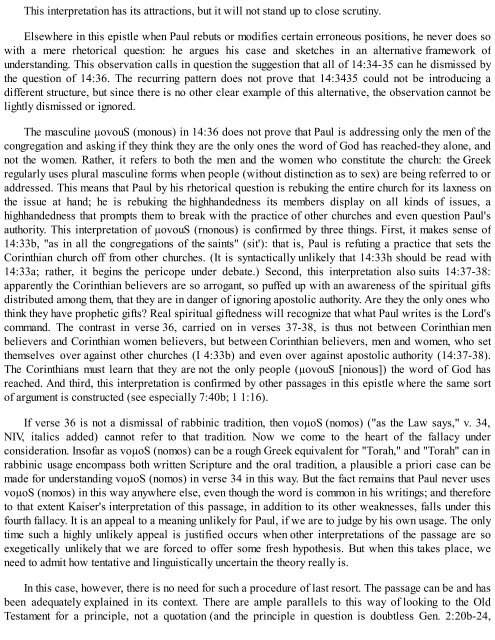Exegetical Fallacies - D. A. Carson
Exegetical Fallacies - D. A. Carson
Exegetical Fallacies - D. A. Carson
Create successful ePaper yourself
Turn your PDF publications into a flip-book with our unique Google optimized e-Paper software.
This interpretation has its attractions, but it will not stand up to close scrutiny.<br />
Elsewhere in this epistle when Paul rebuts or modifies certain erroneous positions, he never does so<br />
with a mere rhetorical question: he argues his case and sketches in an alternative framework of<br />
understanding. This observation calls in question the suggestion that all of 14:34-35 can he dismissed by<br />
the question of 14:36. The recurring pattern does not prove that 14:3435 could not be introducing a<br />
different structure, but since there is no other clear example of this alternative, the observation cannot be<br />
lightly dismissed or ignored.<br />
The masculine µovouS (monous) in 14:36 does not prove that Paul is addressing only the men of the<br />
congregation and asking if they think they are the only ones the word of God has reached-they alone, and<br />
not the women. Rather, it refers to both the men and the women who constitute the church: the Greek<br />
regularly uses plural masculine forms when people (without distinction as to sex) are being referred to or<br />
addressed. This means that Paul by his rhetorical question is rebuking the entire church for its laxness on<br />
the issue at hand; he is rebuking the highhandedness its members display on all kinds of issues, a<br />
highhandedness that prompts them to break with the practice of other churches and even question Paul's<br />
authority. This interpretation of µovouS (rnonous) is confirmed by three things. First, it makes sense of<br />
14:33b, "as in all the congregations of the saints" (sit'): that is, Paul is refuting a practice that sets the<br />
Corinthian church off from other churches. (It is syntactically unlikely that 14:33h should be read with<br />
14:33a; rather, it begins the pericope under debate.) Second, this interpretation also suits 14:37-38:<br />
apparently the Corinthian believers are so arrogant, so puffed up with an awareness of the spiritual gifts<br />
distributed among them, that they are in danger of ignoring apostolic authority. Are they the only ones who<br />
think they have prophetic gifts? Real spiritual giftedness will recognize that what Paul writes is the Lord's<br />
command. The contrast in verse 36, carried on in verses 37-38, is thus not between Corinthian men<br />
believers and Corinthian women believers, but between Corinthian believers, men and women, who set<br />
themselves over against other churches (I 4:33b) and even over against apostolic authority (14:37-38).<br />
The Corinthians must learn that they are not the only people (µovouS [nionous]) the word of God has<br />
reached. And third, this interpretation is confirmed by other passages in this epistle where the same sort<br />
of argument is constructed (see especially 7:40b; 1 1:16).<br />
If verse 36 is not a dismissal of rabbinic tradition, then voµoS (nomos) ("as the Law says," v. 34,<br />
NIV, italics added) cannot refer to that tradition. Now we come to the heart of the fallacy under<br />
consideration. Insofar as voµoS (nomos) can be a rough Greek equivalent for "Torah," and "Torah" can in<br />
rabbinic usage encompass both written Scripture and the oral tradition, a plausible a priori case can be<br />
made for understanding voµoS (nomos) in verse 34 in this way. But the fact remains that Paul never uses<br />
voµoS (nomos) in this way anywhere else, even though the word is common in his writings; and therefore<br />
to that extent Kaiser's interpretation of this passage, in addition to its other weaknesses, falls under this<br />
fourth fallacy. It is an appeal to a meaning unlikely for Paul, if we are to judge by his own usage. The only<br />
time such a highly unlikely appeal is justified occurs when other interpretations of the passage are so<br />
exegetically unlikely that we are forced to offer some fresh hypothesis. But when this takes place, we<br />
need to admit how tentative and linguistically uncertain the theory really is.<br />
In this case, however, there is no need for such a procedure of last resort. The passage can be and has<br />
been adequately explained in its context. There are ample parallels to this way of looking to the Old<br />
Testament for a principle, not a quotation (and the principle in question is doubtless Gen. 2:20b-24,



